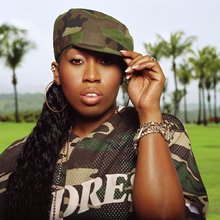Missy Elliott was born in Portsmouth, Virginia, on July 1, 1971. Elliott worked as a songwriter and producer before getting her own record label. Her inventive style and ability to transcend hip-hop's ideas about women gave her five platinum albums in a row—including her debut album, Supa Dupa Fly—and numerous honors, including five Grammy Awards. With success as a performer, songwriter and producer, Elliott became hip-hop's first female mogul.
QUOTES
"I always feel the need to work as if I don't have a deal, because that's what's going to keep me around for a long time."
– Missy Elliott
Early Life
Missy Elliott was born Melissa Arnette Elliott on July 1, 1971, in Portsmouth, Virginia. As a child, she would often sing for her family and neighbors. Even at a young age, Elliott knew she that wanted to be a star.
Elliott's childhood was marked by trauma. When she was eight, she was raped on a regular basis by a 16-year-old cousin. The sexual abuse lasted for a year, until a relative discovered what was happening. She also witnessed her father's almost daily beatings of her mother. The situation had Elliott sending pleas for help to stars like Michael and Janet Jackson. Finally, when she was a teenager, Elliott and her mother left her father.
Success in Hip-Hop
Free from worries about her mother's safety, Elliott was able to fully focus on music and performing. She formed a group, Sista, that was signed to Swing Mob Records in 1991. Unfortunately, financial problems meant that Sista's album was not released. After the group split up, Elliott and her friend Timbaland started writing and producing songs, including hits for their friend Aaliyah.
Although her appearance didn't match ideas about female beauty in the male-centric world of hip-hop, Elliott got the chance to form her own label, The Goldmind, Inc., at Elektra Records. Her first album,Supa Dupa Fly (1997), went platinum and earned Elliott the designation of rap artist of the year from Rolling Stone. Her next two albums also went platinum. Elliott's 2002 album, Under Construction, set sales records for a female-headed rap album, selling 2.1 million copies in the United States.
Elliott won two Grammy Awards in 2002, one of which was for her song "Get Ur Freak On." She went on to win Grammys for the songs "Scream a.k.a. Itchin'" and "Work It." Her music video for "Lose Control" also won a Grammy Award. Along with her Grammys, Elliott has received American Music Awards, multiple BET Awards for best female hip-hop artist and several MTV Video Awards for her inventive, eye-catching music videos.
Personal Life
Though the hard-working Elliott has occasionally put her personal life aside in order to focus on work, she takes time to enjoy the jewelry, cars and homes her success has given her. She remains close with her mother and her family.
Elliott grew up in the Baptist faith, and has stated that faith will always be a large part of her life. She explained in 2003 that her faith helped her cope with her abuse, saying, "You have to find some kind of peace.
I believe in a higher being, and that gives me faith to be strong and go on."
Elliott has also had to deal with Graves' disease, an autoimmune disorder that affects the thyroid. With a doctor's help, she learned to manage the condition through diet and exercise.
Continuing Career
Elliott's phenomenal success in hip-hop led to her appearing on TV, in ad campaigns and in films, but music is still her focus. Recently, Elliott added Little Mix to the diverse list of artists she has worked with--a list that includes Christina Aguilera, Eminem,Mick Jagger and Whitney Houston--when she performed guest vocals for the group's 2013 release "How Ya Doin'."
After being dismissed for her appearance at the start of her career, Elliott ended up carving her own path to success. An entrepreneur and visionary, Elliott's skills in writing, producing and performing helped her become hip-hop's first female mogul and a hip-hop icon.

